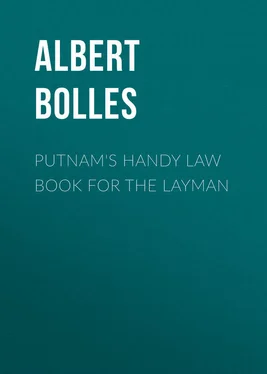Albert Bolles - Putnam's Handy Law Book for the Layman
Здесь есть возможность читать онлайн «Albert Bolles - Putnam's Handy Law Book for the Layman» — ознакомительный отрывок электронной книги совершенно бесплатно, а после прочтения отрывка купить полную версию. В некоторых случаях можно слушать аудио, скачать через торрент в формате fb2 и присутствует краткое содержание. Издательство: Иностранный паблик, Жанр: foreign_antique, foreign_prose, на английском языке. Описание произведения, (предисловие) а так же отзывы посетителей доступны на портале библиотеки ЛибКат.
- Название:Putnam's Handy Law Book for the Layman
- Автор:
- Издательство:Иностранный паблик
- Жанр:
- Год:неизвестен
- ISBN:нет данных
- Рейтинг книги:5 / 5. Голосов: 1
-
Избранное:Добавить в избранное
- Отзывы:
-
Ваша оценка:
- 100
- 1
- 2
- 3
- 4
- 5
Putnam's Handy Law Book for the Layman: краткое содержание, описание и аннотация
Предлагаем к чтению аннотацию, описание, краткое содержание или предисловие (зависит от того, что написал сам автор книги «Putnam's Handy Law Book for the Layman»). Если вы не нашли необходимую информацию о книге — напишите в комментариях, мы постараемся отыскать её.
Putnam's Handy Law Book for the Layman — читать онлайн ознакомительный отрывок
Ниже представлен текст книги, разбитый по страницам. Система сохранения места последней прочитанной страницы, позволяет с удобством читать онлайн бесплатно книгу «Putnam's Handy Law Book for the Layman», без необходимости каждый раз заново искать на чём Вы остановились. Поставьте закладку, и сможете в любой момент перейти на страницу, на которой закончили чтение.
Интервал:
Закладка:
A petition may be filed against a person who is insolvent and has committed an act of bankruptcy within four months after such action. Three or more creditors who have provable claims amounting to five hundred dollars in excess of securities held against a debtor may file the petition, or if all the creditors are less than twelve, then one of them may file the petition provided the debtor owes him the above stated amount. Creditors holding claims which are secured, or have priority, must not be considered in determining the number of creditors and the amount of claims for instituting involuntary proceedings. The petition should state the names and residences of the petitioning creditors, also that of the bankrupt, his principal place of business, the nature of it, his act of bankruptcy, that it occurred within four months of the filing of the petition, and that the amount of the claims against him exceed five hundred dollars. The petition must be signed and properly verified, and may be afterward amended for cause in the interest of justice. On the filing of the petition a writ of subpœna is issued addressed to the bankrupt commanding him to appear before the court at the place and on the day mentioned to answer the petition. The next step, after serving the petition, is for the bankrupt to file his answer. Meanwhile his property may be seized by a marshal or receiver on proof that he is neglecting it or that it is deteriorating.
Within ten days after one has been judicially declared to be a bankrupt, he must file in court a schedule of his property, including a list of his creditors and the security held by them. Then follows the first meeting of the bankrupt's creditors, within thirty days after the adjudication. The judge or referee must be present at this meeting, also the bankrupt if required by the court. Before proceeding with other business the referee may allow or disallow the claims of creditors presented at the meeting, and may publicly examine the bankrupt, or he may be examined at the instance of any creditor. At this meeting the creditors may elect a trustee.
Subsequent meetings may be held at any time and place by all the creditors whose claims have been allowed by written consent: the court also may call a meeting whenever one fourth of those who have proved their claims file a written request to that effect.
Only a creditor who owns a demand or provable claim can vote at creditors' meetings. Nor can other creditors through filing objections to a claim prevent a bona fide claimant from voting. A creditor of an individual member of a bankrupt partnership cannot vote. Nor can creditors holding claims that are secured or that have priority vote only to a limited extent, so far as their claims are on the same basis as other creditors. To entitle secured and preferred creditors to vote at the first meeting on the whole of their claims, they must surrender their securities or priorities. If a portion of a creditor's debt is secured and a portion is unsecured, he may vote on the unsecured portion. An attorney, agent, or proxy may represent and vote at creditors' meetings, first presenting written authority, which must be filed with the referee. The referee who presides at the first meeting makes up or decides on its membership. Matters are decided at the meeting by a majority vote in number and amount of claims of all the creditors whose claims have been allowed and are present.
The next stage in bankruptcy proceedings is the proving and allowance of claims. Only such debts are provable as existed at the time of filing the petition. Every debt which may be recovered either at law or in equity may be proved in bankruptcy. A claim barred by the statute of limitations is not provable, nor is a contingent liability. On the other hand a debt founded on a contract express or implied may be proved, for example, damages arising from a breach of a contract prior to the adjudication in bankruptcy. Again, if there are agreements or covenants in a contract of a continuing character the bankrupt is still liable on them notwithstanding his discharge in bankruptcy. If the amount of a claim is unliquidated the act sets forth the mode of proceeding. Among other claims that may be proved are judgments, debts founded on an open account, and rents.
The claims of creditors who have received preferences are not allowed unless they surrender them. Thus money paid on account by an insolvent debtor must be surrendered before a claim for the balance due on the account can be proved. If proceedings are begun by the trustee to set aside a preferential transfer to a creditor who puts in a defense, he cannot thereafter surrender his preference and prove his claim. If a creditor in proving his debt fails to mention his security, if he has any, he will be deemed to have elected to prove his claim as unsecured.
Claims that have been allowed may be reconsidered for a sufficient reason and reallowed or rejected in whole or in part, as justice may require, at any time before the closing of the estate. The reëxamination may be had on the application of the trustee or of any creditor by the referee, witnesses may be called to give evidence, and the referee may expunge or reduce the claim or adhere to the original allowance.
The appointment of the trustee by the creditors at their first meeting is subject to the approval or disapproval of the referee or the judge. Should the creditors make no appointment the court appoints one. As soon as he has been appointed it is the duty of the referee to notify him in person or by mail of his appointment. If he fails to qualify or a vacancy occurs, the creditors have an opportunity to make another appointment. If a trustee accepts he must give a bond with sureties for the faithful performance of his duties. He may also be removed for cause after notice by the judge only. Should he die or be removed while serving, no suit that he was prosecuting or defending will abate but will be continued by his successor.
The trustee represents the bankrupt debtor as the custodian of all his property that is not exempt; also the creditors, and gathers all the bankrupt's property from every source and protects and disposes of it for the best interests of the creditors, and pays their claims. In short, he succeeds to all the interests of the bankrupt, is an officer of the court and subject to its orders and directions. He must deposit all moneys received in one of the designated depositories, can disburse money only by check or draft, and at the final meeting of the creditors must present a detailed statement of his administration of the estate. During the period of settlement he must make a report to the court in writing of the condition of the estate, the money on hand, and other details within the first month after his appointment, and bi-monthly thereafter unless the court orders otherwise.
The federal Bankruptcy Act prescribes what property passes to the trustee and also what is exempt. Whatever property on which a levy could have been made by judicial process against the bankrupt passes to the trustee. On the other hand, the income given to a legatee for life under a will providing it shall not be subject to the claims of creditors does not pass to the trustee. If the bankrupt has an insurance policy with a cash surrender value payable to himself or personal representatives he may pay or secure this sum to the trustee and continue to hold the policy. And a policy of insurance payable to the wife, children, or other kin of the bankrupt is no part of the estate and does not pass to the trustee.
After one month, and within a year from the adjudication of bankruptcy, the bankrupt may apply for a discharge. The petition must state concisely the orders of the court and the proceedings in his case. Creditors must have at least ten days' notice by mail of the petition, and then the judge hears the application for discharge, and considers the proofs in opposition by the parties in interest. Unless some creditor objects and specifies his ground of objection, the petition will be granted. The Bankruptcy Act states several reasons for refusing a discharge, especially when the bankrupt has concealed his property instead of making an honest, truthful statement respecting it, or has not kept proper books of account with the fraudulent intent to conceal his true financial condition and defraud his creditors.
Читать дальшеИнтервал:
Закладка:
Похожие книги на «Putnam's Handy Law Book for the Layman»
Представляем Вашему вниманию похожие книги на «Putnam's Handy Law Book for the Layman» списком для выбора. Мы отобрали схожую по названию и смыслу литературу в надежде предоставить читателям больше вариантов отыскать новые, интересные, ещё непрочитанные произведения.
Обсуждение, отзывы о книге «Putnam's Handy Law Book for the Layman» и просто собственные мнения читателей. Оставьте ваши комментарии, напишите, что Вы думаете о произведении, его смысле или главных героях. Укажите что конкретно понравилось, а что нет, и почему Вы так считаете.












